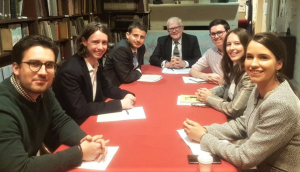Interns Presentations
Published 29 May 2019
On Tuesday 21st May the current interns addressed the Institute on topics of their choice. Introductions to their presentations can be found here: https://aiiansw.tidyhq.com/public/schedule/events/25011-an-evening-with-the-interns
Additional points made in their presentations and in response to questions were:
- The Prespa agreement between Greece and North Macedonia was more than a resolution about naming; decades of hostility, dating from the break-up of Yugoslavia and rooted in historical enmities, have ended and practical cooperation has been established, for example with the resolution of territorial disputes. By a narrow margin, Greek pride has been satisfied and the former FYROM has achieved recognition of its identity and a basis for cooperative arrangements with the international community, including NATO and the EU.
- Despite Egypt’s lack of obvious direct benefits to the US, such as oil supplies, broader strategic interests (including overflight rights and access to the Suez canal) have meant substantial continuing US military aid to Egypt through four decades of political change. This relationship has given the US political legitimacy in the Arab world, promoted stability and protected Israel. The US enmity under Trump toward Iran adds to Egypt’s value as a regional ally.
- China’s presentation internationally of its anti-Uyghur campaign as a part of the global “war on terror” had met only limited success. Substantial publicity about the numerous – at least 27 – “re-education” centres in Xinjiang with at least 800,000 and as many as 2 million Muslim inmates had damaged China’s international image; its attempts to present this oppression as part of the world-wide action against terrorism post 9/11 were unconvincing. A fundamental Chinese aim is to avoid disruption of its belt-and-road project, which involves important transport links through Xinjiang to central Asia.
- There has been mixed progress in international climate agreements since the 1997 Kyoto protocol got the process off to a modest start. While the Copenhagen summit in 2009 failed to substantially advance the international climate regime, the 2015 Paris summit, by changing the focus from legally-binding burden distribution to nationally-determined commitments, expanded the range of countries involved in climate action. Ultimately, while there are questions about the regime’s effectiveness, there is minimal support for withdrawing from climate agreements and the international regime is flexible enough to incorporate non-state actors into climate action programs in the future.
- Australia’s 75 per cent increase in defence aid to the Pacific since 2007 has occurred against a history where waves of action and energy towards the Pacific are interspersed with periods of relative neglect, with strategic and anti-crime engagement prevailing over humanitarian and environmental programs. Canberra’s off-hand approach towards the region suggests it can no longer be considered as the sole regional hegemon, especially with a growing international competition for influence in the South Pacific from powers like China and a reinvigorated France.
- Popular nationalism is part of the explanation for China’s more assertive foreign policy in recent years. Although freedom of speech is undoubtedly restricted in China, as recent crackdowns on academics and feminist groups have highlighted, there remains some space for the expression of public opinion. Recent examples include the removal of corrupt officials and Weibo’s backtrack on its ban of LGBTQ content. The Chinese communist party actively encourages nationalistic expression as it supports the legitimacy of the regime. However, it is doubtful that popular nationalism constrains the CCP’s foreign policy in any significant way. It is closely monitored. Australia should be aware of these forces in China’s domestic politics as we work to formulate a coherent China policy.

Interns (from left) Nick Conomos, Alex McManis, Kevin Fine, Euan Moyle, Lucy Nason and Hannah Green with AIIA NSW president Ian Lincoln (centre)